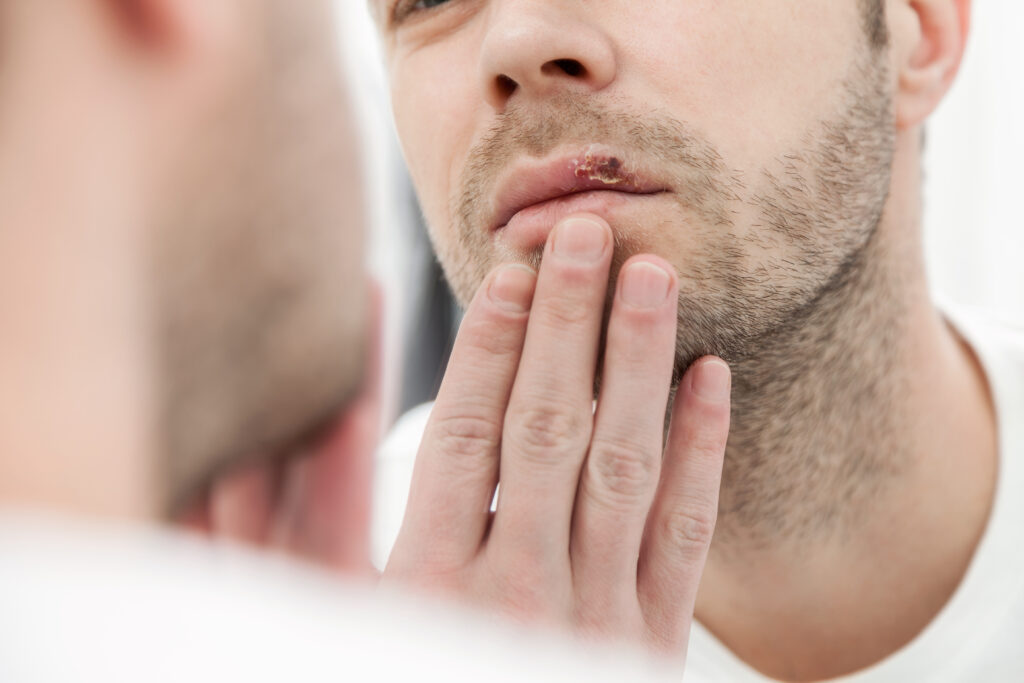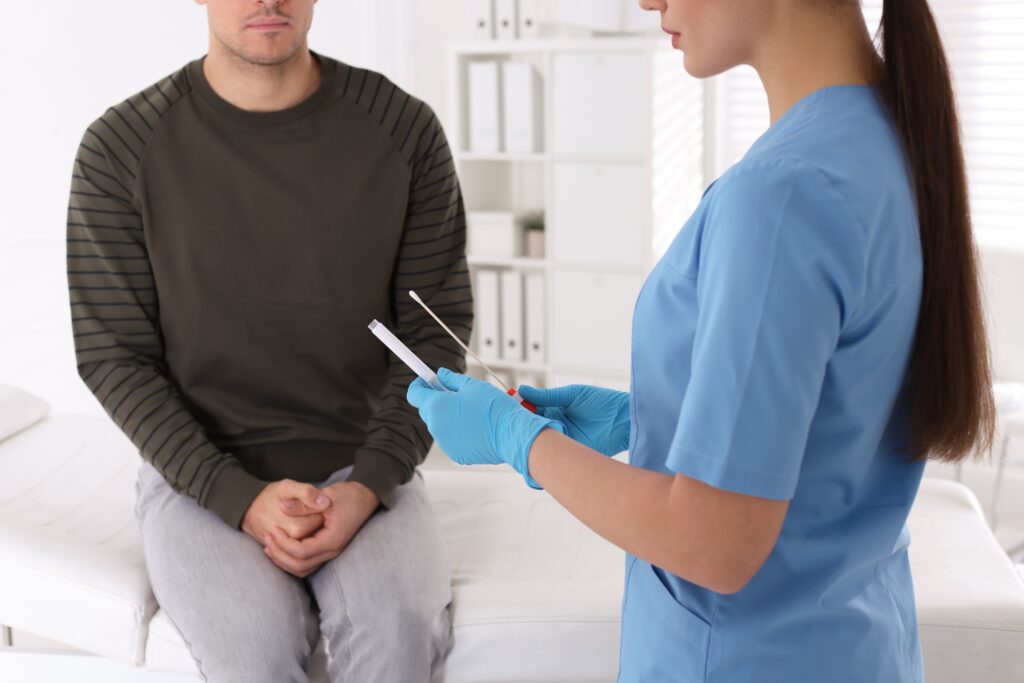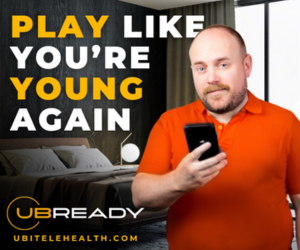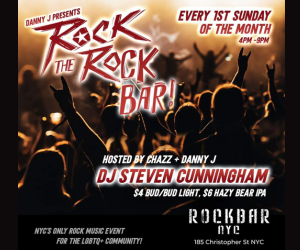The Truth About Herpes
One STI that is routinely glossed over in our discussions of sexual health is herpes, otherwise known as the herpes simplex virus, commonly abbreviated as HSV1 or HSV2. The distinction between HSV1 and HSV2 used to be the location of the herpes outbreaks, with HSV1 indicating oral herpes and HSV2 indicating genital herpes; but that has since changed as sex practices have evolved with increasing rates of oral HSV2 and genital HSV1.
According to the CDC: “You can get genital herpes by having vaginal, anal, or oral sex with someone who has the infection. You can get herpes if you have contact with: a herpes sore; saliva from a partner with an oral herpes infection; genital fluids from a partner with a genital herpes infection; skin in the oral area of a partner with oral herpes; or skin in the genital area of a partner with genital herpes. You also can get genital herpes from a sex partner who does not have a visible sore or is unaware of their infection. It is also possible to get genital herpes if you receive oral sex from a partner with oral herpes.”
According to our wonderful friend Dr George: “I think maybe 30 to 50% of people have had an exposure or infection with HSV2 but, we don’t really use the words ‘genital herpes’ as much anymore and the reason for that is because HSV1, which is the cold sore virus, is not limited to lips. You can get it on your bum, you can get it on your penis, you can get it wherever. And the same way that you can translocate genital herpes to other sites in the body, it is wherever the virus enters the body that you’re going to get the infection.”

With respect to HSV1, Johns Hopkins Medicine estimates that infections range from 50 to 80% of all adults in the USA. The reason for the huge variance in data is that most people do not test for HSV at all during sexual health screenings. The only concrete way to diagnose it is to swab a sore and test for the virus. Blood tests do exist, but many medical health professionals advise against them due to varying rates of reliability.
Rates of infection tend to be underreported as well due to lack of symptoms and the fact that the virus can lie dormant for a very long time before becoming an active infection.
“Important things to note is that I often see couples come in very upset because one person suddenly has genital herpes” explains Dr. George. “And they’re convinced that they must have gotten it from their current partner, but they probably didn’t. In reality they likely got exposed to it years and years ago, and now it’s just showing up. The first time you get herpes, it’s like a really bad cold. It’s like COVID – severe cold, muscle aches and pains, ulcers inside the mouth or anus, and it can be very, very painful. So it’s an interesting one, but I think if you have herpes, you probably got exposed to it when you were younger.”
George goes on to explain that generally as a rule, herpes should become less frequent and less severe every time an outbreak occurs. Treatment is available to help with outbreaks in the form of the anti-viral drugs acyclovir, valacyclovir, and famciclovir.
“It is absolutely worthwhile taking medication when you have an outbreak because it reduces the severity of the illness. And it reduces the chance of transmission. The risk of transmission when somebody has an outbreak is between 80 to 98% but that can be greatly reduced if you’re on antivirals because it stops the virus from making copies of itself. When you get an outbreak, you have to get on treatment within 72 hours. After 72 hours it has no effect, so you’re best to just get on the treatment as early as possible.”

Some medical professionals will prescribe daily antivirals for patients who have frequent outbreaks, so how does suppressive treatment play into transmission?
“We know that people can transmit herpes even if they don’t have an outbreak”, George said, “so the risk of transmission of herpes to your sexual partners is, depending on the data, somewhere between 5 and 10%. Even if you don’t have an outbreak, you can take a daily valacyclovir and that reduces the chance of transmission down to just under 2%, so that’s a bonus. It also reduces the frequency and severity of outbreaks, and for many people it completely stops the risk of outbreaks. So definitely talk with your doctor to see what the best option is for you.”
Wondering whether daily valacyclovir can be used to prevent infection in the first place (like PrEP), I pressed the issue with George.
“When you look at the data, the cost of putting everybody on valacyclovir wasn’t worth the reduction in risk. I think that the key point here is we don’t want to add another medicine to everybody’s life just to prevent them getting a virus that’s very, very common. The people we should target are those living with herpes who are getting frequent outbreaks, it’s worth having the conversation with them. Do you want to go on suppressive treatment to, one, stop you from getting frequent infections, and two, reduce the risk of transmission to your partners?”
With respect to warning signs for an impending outbreak for those with herpes or those who might be unaware that they have the virus:
“Generally, some people will get a tingling or burning sensation or even pain around the site of infection, because remember the virus is in the nerve so it could very well give you that painful stimuli first or an itch, and then you will see redness and sometimes blisters or a sore. Those blisters are filled with copies of the virus ready to be shared around the world. The minute you get any sort of tingle or anything like that, that’s when you need to start the suppressive treatment and hopefully arrest it at that point. Unfortunately, some people will get outbreaks with no warning at all. You will learn to read your body. The thing is if you are on suppressive treatment, you’ll know that the highest risk times for outbreak are when you’re really under the pump, when you’re worn out and stressed. Sometimes sunburn in in the area can trigger an outbreak as well.”

With regard to a cure, Dr George says we are still a ways off. However new genetic research and mRNA vaccines show promise for potential vaccines in the future.
“I would guess that the bottom line of it all is that herpes doesn’t really affect physical health that much. It’s more the stigma and the mental health aspects of it that are damaging; unless you are an immunocompromised person in which case an outbreak can be very painful and have quite an impact on their physical well-being.”
For more information about herpes check out the CDC website.
Dr. George Forgan- Smith is an expert in gay men’s health dedicated to the bear, leather and kink communities which he serves faithfully in Melbourne, Australia. In addition to working at the Collins Street Medical Centre and creating tons of educational content for his social media accounts (links below), he is the creator of The Healthy Bear website which he uses to share vital health information pertaining to and about our community.
Stay in touch with Dr George and up to date on the latest in gay men’s health by signing up to his mailing list HERE.
Follow Dr. George on social media: Twitter I Instagram I YouTube
***Disclaimer: You must not rely on the information on this website as an alternative to medical advice from your doctor or other professional healthcare provider. If you have any specific questions about any medical matter you should consult your doctor or other professional healthcare provider. If you think you may be suffering from any medical condition you should seek immediate medical attention. You should never delay seeking medical advice, disregard medical advice, or discontinue medical treatment because of information on this website.





















